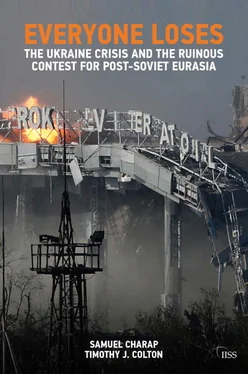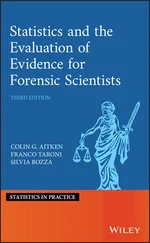US policymakers, to quote Stephen Sestanovich, ambassador-at-large for the former Soviet Union in Clinton’s second term, sought a new world order erected on shared values. ‘But they also sought to preserve and strengthen America’s place in the post-Cold War balance of power. The two goals seemed inseparable. Washington saw no other way to make its hopeful world order a reality. NATO enlargement was part and parcel of this reality.’ [36] Stephen Sestanovich, ‘Could It Have Been Otherwise?’, American Interest , vol. 10, no. 5, 2015, http://www.the-american-interest.com/2015/04/14/could-it-have-been-otherwise/ .
It exemplified, in other words, geopolitics married to geo-ideas. Justification was found in the principle of freedom of choice, one of the two keystones of the Charter of Paris. Individual countries, and they alone, should decide on what security alignments were to their liking. If any or all of the post-communist nations of East Central Europe threw in their lot with the US-shepherded Euro-Atlantic alliance, no other state – the United States included, ironically – could question that choice.
Not only were there benefits to be reaped, but the costs were largely seen as negligible. Popular interest in the enlargement issue, pro and con, was thin in the US and other NATO member states. ‘Many opponents bemoaned the lack of visible public debate for such a major foreign policy initiative’, writes Goldgeier. ‘But why would the public be interested in what appeared to be a low-cost extension of a defense commitment in a benign strategic environment?’ [37] Goldgeier, Not Whether But When , pp. 169–70. Exhaustive accounts of the domestic politics of NATO enlargement (and the roles of politicians, business interests, think tanks and ethnic lobbies) can be found in these books: Ronald D. Asmus, Opening NATO’s Door: How the Alliance Remade Itself for a New Era (New York: Council on Foreign Relations, 2002); George W. Grayson, Strange Bedfellows: NATO Marches East (Lanham, MD: University Press of America, 1999).
Potential censure from Moscow, the only real obstacle, was deemed surmountable by American and European officials. They reckoned, correctly, that Russia was so enervated by its post-communist transformation that it could not block enlargement, and their Western-leaning counterparts like Kozyrev did not seem overly bothered by it.
Nor were the analytical costs prohibitive. No soul-searching or intellectual heavy lifting was required. German reunification offered a convenient template. Its prefab logic required aspirants to membership of the club to demonstrate a zeal for admission and proof of their credentials under a pre-existing formula. Prefab change by definition did not allow for adjustment of the formula or give-and-take among current and prospective members about its design, thus excluding countries (like Russia) that demanded a say in such matters.
There were no genuine negotiations with Russia on the central issue of the merits of NATO’s extension, let alone the details of the process. Attitudinal openness in Moscow gradually dissipated as awareness dawned that a joint search for a solution was not on the cards. Yeltsin grounded his early receptivity to talking about Russia-in-NATO in indivisibility, the second of the pillars of the Charter of Paris. Russia was comfortable inside a revised security framework only so long as its prerogatives and stature were taken into account, with all that connoted for the US having to share control. Change without Moscow’s participation and consent was doomed to be interpreted as ‘a sign that we were not welcome’, as several former ranking Russian functionaries put it in interviews.
Clinton was agreeable to the theoretical possibility of Russian admission. In his administration, however, it was scripture that entry for Russia could be concretely entertained only after other countries had been dealt with. As Ronald Asmus, who ran enlargement policy in the Department of State in 1997–2000, testified later:
Clinton had indulged Yeltsin on [the point of eligibility], while making it clear that this was not a realistic prospect any time soon. Internally, I often told my staff that we had the 10, 25, and 50-year plans. The first was for Central and Eastern Europe, the second for Ukraine, and the third for Russia.
Christopher’s ‘no one ahead of others’ had morphed into ‘everyone ahead of Russia’. By now even whispers of a hypothetical Russian membership bid fuelled antagonism. Asmus reports American trepidation that Moscow ‘might try… to create mischief by actually applying for membership’. When Kozyrev’s hard-nosed successor as foreign minister, Yevgeny Primakov, mooted an application in 1996, the response from Talbott was terse: ‘Russia would have to get into the same queue and meet the same criteria as other candidates.’ Primakov suspected the Americans of trying to trick the Russians into a premature statement of intent, which could then be used to refute any objections to other applications. [38] Quotations from Asmus, Opening NATO’s Door , p. 192; Evgenii Primakov, Vstrechi na perekrestkakh (Moscow: Tsentrpoligraf, 2015), pp. 221–2.
At work under the surface was the bare-knuckled calculus of security. NATO spokespersons trumpeted that their policy was not anti-Russian. That may have been true, but the leaders of the aspirants to membership seldom concealed the fact that they considered it more than anything else a hedge against revanchism by Russia, a point echoed by a number of Western strategists. Even if the policy was not expressly anti-Russian, Russia was for all practical purposes disqualified from partaking and had no guarantees whatsoever against future encroachment on its interests. Where the diplomacy of the late 1980s had rested on an amorphous dream of assimilation into Western and global systems, ‘the 1990s were marked by the steady atrophy of serious efforts to integrate Russia’. [39] Daniel Deudney and G. John Ikenberry, ‘The Unravelling of the Cold War Settlement’, Survival: Global Politics and Strategy , vol. 51, no. 6, December 2009–January 2010, p. 51.
Yeltsin and his government for some time continued their late Soviet predecessors’ touting of the CSCE/OSCE as an alternative to a widened NATO. In May 1994 they proposed to outfit it with ‘a leadership organ of restricted composition’, a compact executive board modelled on the UN Security Council whose members – one of them Russia – would have veto rights. This was in a sense the Russian edition of prefab institutional design, applying an antecedent model to current problems. But no sympathy for its version of OSCE reform was forthcoming from the West, from aspirants to NATO or from the smaller countries that felt they would lose from a potent executive. [40] See the summary in Maksim Yusin, ‘Moskve ne udalos’ provesti perestroiku SBSE’, Izvestiya , 12 October 1994.
The best Moscow could manage by way of damage limitation and a consolation prize was the Founding Act on Mutual Relations, Cooperation and Security between NATO and the Russian Federation, an agreement signed in Paris in May 1997. As Primakov stated in his memoirs, the Russian aim was ‘not to drop our negative position on NATO expansion’ and at the same time to work out ways to ‘minimise the consequences that were most threatening to our security and most inconsistent with our interests’. In conversations in the wings, Primakov warned that admission of any ex-Soviet republic hereafter was ‘unacceptable’ and would traverse a ‘red line’ for Russia. [41] Primakov, Vstrechi na perekrestkakh , p. 221.
The Founding Act stated that NATO and Russia ‘do not consider each other as adversaries’ and ‘share the goal of overcoming the vestiges of earlier confrontation and competition and of strengthening mutual trust and cooperation’. [42] ‘Founding Act on Mutual Relations, Cooperation and Security between NATO and the Russian Federation Signed in Paris, France’, 27 May 1997, http://www.nato.int/cps/en/natohq/official_texts_25468.htm .
Читать дальше











